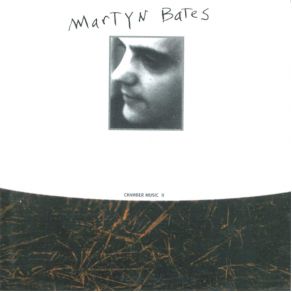Chamber Music, Vol. 2
Download links and information about Chamber Music, Vol. 2 by Martyn Bates. This album was released in 1994 and it belongs to Ambient, Electronica, Jazz genres. It contains 27 tracks with total duration of 01:12:42 minutes.

|
|
|---|---|
| Artist: | Martyn Bates |
| Release date: | 1994 |
| Genre: | Ambient, Electronica, Jazz |
| Tracks: | 27 |
| Duration: | 01:12:42 |
| Buy it NOW at: | |
| Buy on iTunes $10.99 | |
Tracks
[Edit]| No. | Title | Length |
|---|---|---|
| 1. | Be Not Sad | 4:29 |
| 2. | In the Dark Pine-Wood | 2:24 |
| 3. | His Love | 0:23 |
| 4. | He Who Hath Glory Lost | 1:37 |
| 5. | His Companion | 0:23 |
| 6. | Of That So Sweet Imprisonment | 3:31 |
| 7. | This Heart | 5:24 |
| 8. | Between Kiss and Kiss | 1:05 |
| 9. | Silently Shes Combing | 3:19 |
| 10. | On the Drappled Grass | 0:50 |
| 11. | Lightly Come or Lightly Go | 4:59 |
| 12. | Thou Leanest to the Shell of Night | 1:48 |
| 13. | At Ghosting Hour | 0:54 |
| 14. | Though I Thy Mithridates Were | 2:39 |
| 15. | Gentle Lady, Do Not Sing | 2:52 |
| 16. | Dear Heart | 3:47 |
| 17. | Love Came to Us | 2:04 |
| 18. | O, It Was Out By Donnycarney | 2:49 |
| 19. | Bat | 1:53 |
| 20. | Rain Has Fallen | 1:31 |
| 21. | Now O Now | 5:58 |
| 22. | The Wind Is Whistling | 1:34 |
| 23. | Sleep Now | 2:58 |
| 24. | Unquiet | 1:21 |
| 25. | All Day I Hear the Noise of Waters | 4:55 |
| 26. | I Hear an Army | 5:00 |
| 27. | Fluttering Whips | 2:15 |
Details
[Edit]Released barely four months after Chamber Music, Vol. 1, this 27-track follow-up completes the song cycle, putting half of James Joyce's 1902 chapbook Chamber Music into a cappella musical settings. Where Vol. 1 had occasionally colored the pieces with ambient keyboards and acoustic instruments, Chamber Music, Vol. 2 is a strictly voice-only affair, the most purely minimalist recording of Bates' entire career. As before, Bates sets Joyce's poetry into melodies taken (often piecemeal) from British and Irish folk tradition, a canny idea that helps to reveal the influence of popular ballad singing on the Irish author's idiosyncratic but surprisingly traditional sense of meter. Often, musical settings of poetry sound forced and awkward; these 27 miniatures sound like Joyce had written these poems to these melodies, and the results are far more natural sounding than is usually the case with this kind of experiment. Bates would experiment further with both folk music and poetry for the next several years, but the two volumes of Chamber Music, Rovi